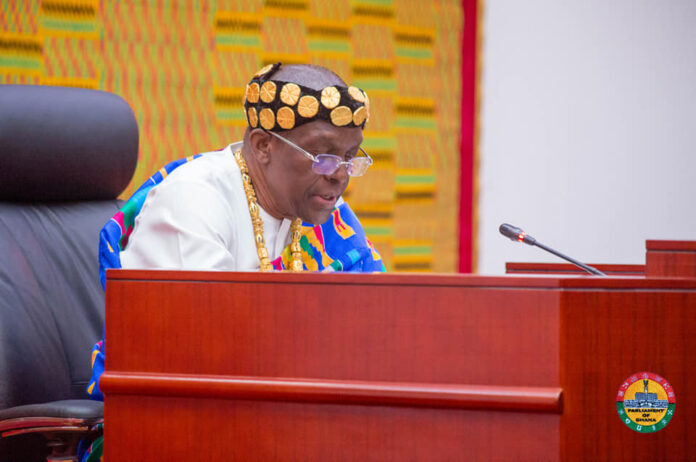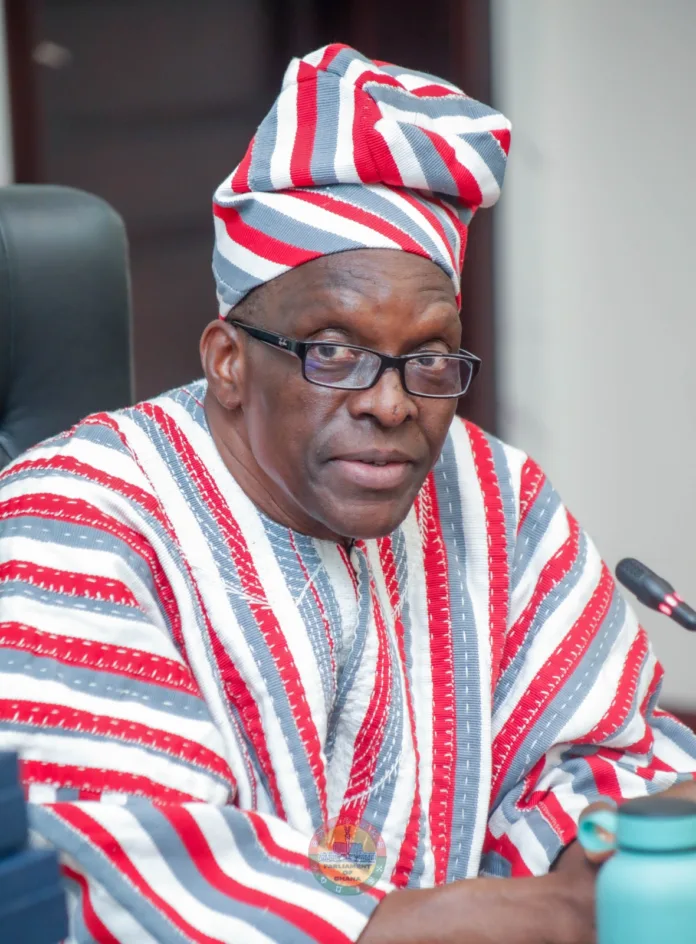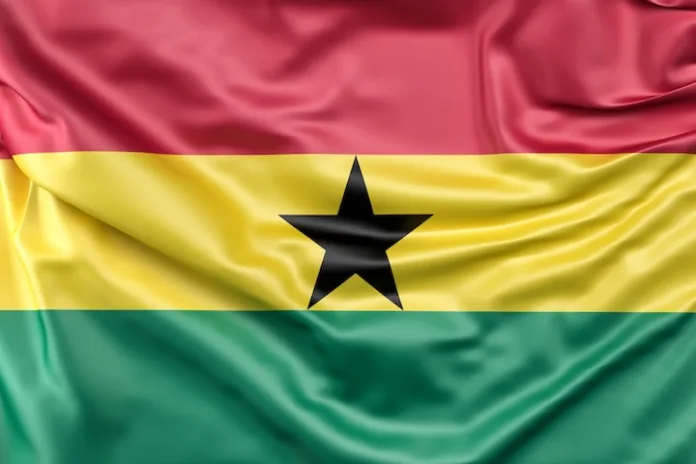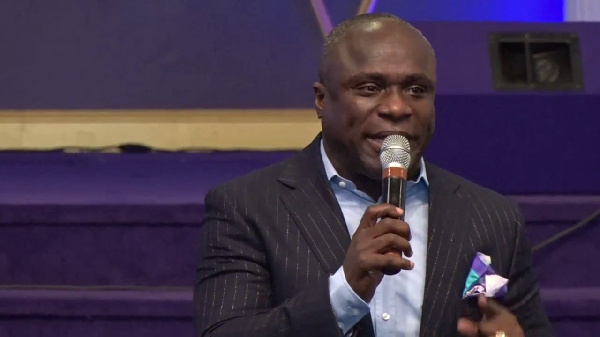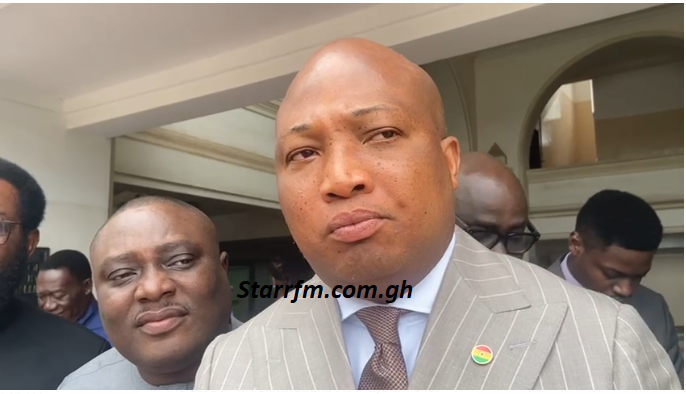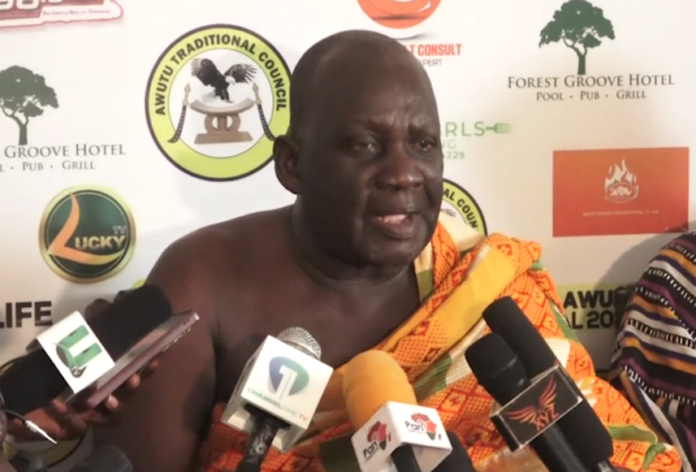The Speaker of Parliament, Alban Bagbin, has insisted that the house will not cease and desist from transmitting the anti-gay bill to the presidency.
On 19 March 2024, the Executive Secretary to the President, Nana Asante Bediatuo, wrote to the Clerk to Parliament demanding that it ceases and desists from attempting to transmit the Human Sexual Values Bill, 2021 to the President for necessary action in accordance with the Constitution.
The Executive Secretary argued that the Office of the President was aware of two pending suits challenging the bill. The letter further added that the Attorney General had advised the President not to take any steps in relation to the Bill until the matters raised by the suit are determined by the Supreme Court.
But Alban Bagbin argues that the President’s actions are unconstitutional.
“The President’s refusal to accept the transmission of the bill is, by all accounts, not supported by the constitutional and statutory provisions that guide our legislative process. The Constitution clearly delineates the steps to be followed once a bill has been passed by Parliament, mandating the transmission of the bill to the President for assent or rejection,” he addressed Parliament.
Alban Bagbin urged the President to follow through with Article 106(7) if he had any issues with the bill.
“Article 106(7) says, ‘Where a bill passed by Parliament is presented to the President for assent, he shall signify within seven days after the presentation to the Speaker that he assents to the bill or that he refuses to assent to the bill, unless the bill has been referred by the President to the Council of State under Article 90 of this Constitution,’ ” he reminded the President.
“Therefore, the refusal to even accept the bill for consideration falls outside the legal bounds established by our constitutional framework. It is incumbent upon the President to accept the bill and take the necessary action within the prescribed constitutional limits, whether that action is assent, refusal, or referral to the Council of State for advice,” Speaker Bagbin added.
“The Parliament of Ghana will comply with the existing legal framework and reject the attempts by the Executive Secretary of the President, through his contemptuous letter, to instruct the Clerk to Parliament, an Officer of Parliament whose position is recognizably under the Constitution. We shall not cease and desist!” he concluded.
Parliament shall not cease and desist from transmitting the anti-gay bill – Bagbin replies Presidency
Parliament unable to approve your nominated ministers – Bagbin to Akufo-Addo
The Speaker of Parliament, Alban Kingsford Sumana Bagbin, has indicated that the house will not be able to continue the consideration processes of the ministers recently nominated by President Akufo-Addo.
The Executive Secretary to the President, Nana Asante Bediatuo, earlier this week, on behalf of the President, wrote to the clerk of parliament directing parliament to desist from transmitting the recently passed Human Sexual Rights and Family Values Bill 2021 to the presidency for assent, citing ongoing injunctions on the bill.
But the Speaker of Parliament has described the posture by the presidency as one that undermines mutual respect for the arms of government.
“The behavior exhibited by the Presidency in refusing to accept the transmission of this bill not only deviates from established democratic practices but also undermines the spirit of cooperative governance and mutual respect for the arms of government,” he told parliamentarians in the house.
Alban Bagbin has further described as contemptuous Nana Asante Bediatuo’s letter on the Human Sexual Rights and Family Values Bill to parliament, adding that although the house will work with existing legal frameworks, parliament, in the same light, will be unable to approve nominated ministers as the house had been notified of an injunction application by South Dayi MP, Rockson Nelson Defeamekpor.
“The Parliament of Ghana will comply with the existing legal framework and reject the attempts by the Executive Secretary of the President, through his contemptuous letter, to instruct the Clerk to Parliament, an Officer of Parliament whose position is recognizably under the Constitution. We shall not cease and desist!” he assured.
“Be that as it may, Hon Members, I also bring to your attention the receipt of a process from the Courts titled Rockson-Nelson Etse K. Dafeamekpor vrs. The Speaker of Parliament and the Attorney-General (Suit no. J1/12/2024), which process was served on the 19th of March 2024, and an injunction motion on notice seeking to restrain the Speaker from proceeding with the vetting and approval of the names of the persons submitted by His Excellency the President until the provisions of the constitution are satisfied… In the light of this process, the House is unable to continue to consider the nominations of His Excellency the President in the “spirit of upholding the rule of law” until after the determination of the application for interlocutory injunction by the Supreme Court,” he finally declared.
IWD 2024: Breaking the Silence, Investing in Women’s Mental Health
In a world that’s constantly in motion, women balance a variety of duties, including career, family, and societal expectations. As we mark International Women’s Day 2024 with the theme “Invest in Her, Accelerate Progress,” it’s critical that we focus on a silent yet pervasive issue: women’s mental health. This article aims to shed light on the unique mental health challenges that women face and the value of investing in their well-being.
The World Health Organization (WHO, 2023, March 31) reports that women experience depression 50% more frequently than males do. The truth is that women face a variety of stressors, ranging from workplace pressures and cultural expectations to the underlying costs of care giving and achieving a work-life balance. Lan and Jain asserted in 2022 that the mental health-related risk factors that disproportionately affect women are pressures created by their multiple roles; gender discrimination and associated pay disparities; and increased rates of poverty, hunger, malnutrition, domestic violence, and sexual abuse.
These variables, together with hormonal swings, contribute to a higher incidence of mental health issues among women, yet only a minor percent of women seek help due to stigmatization. According to the Women’s Health Research Institute at Northwestern University, women are more likely than males to feel stigmatized when seeking help for a mental health problem. This may be due to the fact that most women rely heavily on the opinions of the outside world. Unfortunately, the outside world thinks less of people with mental health issues.The YouGov survey, which was commissioned by the suicide prevention charity Campaign Against Living Miserably (Calm), also unveiled that, one in five young women who sought help for their mental health say they were told they were being “dramatic”. The stigma connected with mental health exacerbates the problem as it prohibits many women from getting assistance.
Ignoring the mental health of women is not just a personal concern; it has far-reaching consequences for society and the economy. Mental health challenges can impede women’s professional growth, hinder their contribution to the workforce, and create a ripple effect on overall productivity. Investing in women’s mental health is, therefore, an investment in the resilience and efficiency of the entire community.
Fortunately, there is a rising recognition of the significance of addressing women’s mental health. Organizations, both public and private, are launching creative support initiatives. These programs, ranging from on-site counseling services in the workplace to mental health awareness campaigns specialized for women, seek to create safe spaces and eradicate the stigma associated with mental health talks.
READ ALSO: IWD 2024: Becoming a Powerhouse Trailblazer for Inclusion
The Role of Workplaces
Workplaces play a pivotal role in shaping the mental health landscape for women. Companies that prioritize employee well-being by offering mental health resources, flexible work arrangements, and supportive environments contribute to the overall empowerment of women. Moreover, the media can support by highlighting success stories of businesses that have prioritized mental health can serve as inspiration for others to follow suit.
Community and Peer Support
Investing in women’s mental health goes beyond corporate responsibility; Research have shown that young women tend to prefer and respond well to supports that are peer-driven. Also, feeling a sense of belonging makes it easier for women to seek for help. Investing in women’s mental health this involves creating a culture of support within communities. Peer support networks, community workshops, and accessible mental health resources can empower women to prioritize their well-being. Acknowledging and addressing mental health challenges openly fosters an environment where seeking help is encouraged rather than stigmatized.

As we rally behind the call to “Invest in Her, Accelerate Progress,” let us not forget the profound impact that mental health has on women’s lives. By breaking the silence surrounding women’s mental health challenges and investing in supportive initiatives, we not only enhance the well-being of individuals, but also contribute to a society where women can thrive personally and professionally. The time to prioritize and invest in women’s mental health is now, for the benefit of current and future generations.
Happy International Women’s Day to All Women!
Published on International Women’s Day 2024, this article issues a call to action, inspiring individuals and communities to actively invest in women and accelerate progress.
Ghana at 67: Reflections on Progress, Challenges, and the Uncharted Road Ahead
As the vivid hues of red, yellow, and green cascade over the streets of Accra and beyond, Ghana is at a crossroads in its 67th Independence Day celebration. Beyond the facade of joyous parades and national flags taking place in Koforidua, Eastern Region, it is critical to reflect on the transition from colonialism to the vibrancy of an independent nation. Exploring the country’s journey, admitting recurring obstacles, and reflecting on the complex route ahead is necessary for informed advancement.
Facing Historical Realities
To map a course forward, a thorough assessment of the historical environment is essential. Ghana has been dubbed Africa’s bright star since it was the first country south of the Sahara to decolonize. Although they were worth writing home about due to some notable developments and achievements, the early years of independence were also chaotic, with economic difficulties and political turmoil.
Kwame Nkrumah, Ghana’s first President, was deposed nine years after independence. For the next 25 years, Ghana was ruled by military dictators, with diverse economic consequences. In 1992, the country reverted to democratic governance, and it has since established itself as a stable, liberal economy.
The transition to democracy prompted additional aid from the West, and Ghana’s economic recovery accelerated throughout President Rawlings’ eight-year presidency. In 2000, the ultimate test of Ghana’s fourth republic arrived. Term constraints prevented him from running for President a third time. The opposition party’s nominee, John A. Kufour, won the presidential election.
President Kufour spent the most of his presidency striving to improve Ghana’s economy and international reputation. He was reelected in 2004. In 2008, John Atta Mills was elected Ghana’s next President. He died in office in 2012 and was succeeded temporarily by his Vice President, John Dramani Mahama, who won the subsequent elections required by the constitution.
Nana Akufo-Addo, the primary opposition leader in Ghana, defeated President John Mahama in the 2016 general election. His win was due to his persuasiveness, as well as the support of his campaign mate, Dr. Mahamudu Bawumia, and his track record in advocating for citizens and opposing unpopular policies and taxes.
Ghanaians believed in him and expected him to elevate Ghana’s economic standing. However, after being sworn into power for the second time after the 2020 elections, Ghanaians started singing a different song. The issues have been overwhelming and many have migrated to the other side of the bridge, wondering what has changed about the current President. As we approach the 2024 elections in December, many questions arise, but the answers are limited. Will it get better?
Recognizing these realities is not an exercise in wallowing on the past, but rather a practical step toward making informed decisions. How have past challenges affected our present, and what lessons can we draw from them as we navigate a constantly changing global landscape?
Celebrating hievements
Ghana’s economic development, characterized by expansion and diversity, is a model for the West African region. By positioning itself as an economic powerhouse, the country has been able to draw in foreign investment and promote stability. Despite occasional difficulties, the political environment is very resilient, illustrating the development of democratic institutions. However, these successes need to be examined closely. For example, how inclusive is the economic growth, and is political stability resulting in real benefits for all Ghanaians?
As we celebrate economic growth, we also need to examine the systems that enable it. While the focus on entrepreneurship is praiseworthy, considerable thought should also be given to the growth’s inclusivity and sustainability. Are policies creating an environment that allows all Ghanaians to actively engage in and profit from the country’s economic landscape, regardless of their background? The equitable distribution of opportunities and resources is a key indicator of true economic empowerment, rather than GDP levels alone.
Advancements in healthcare, education, and gender equality showcase commendable progress. However, the persistence of disparities, especially in rural and marginalized communities, requires a recalibration of our social development strategies. How can we ensure that the benefits of progress reach every corner of the nation, leaving no one marginalized or excluded? The true measure of social progress lies not just in statistical improvements but in the tangible impact on the lives of ordinary Ghanaians.
The Road Ahead
Can we fix our eyes on the road ahead without evaluating our position? How can we even define where we are? What do we label the place we are in? I’ll sort it out later, but the point is that Ghanaians are complaining. Wait! That is an understatement. Ghanaians are wailing, but the administration led by President Nana Akuffo-Addo is not listening.
Many things are dragging us down, but the main ones are the massive public debt, the rapidly rising rate of inflation and devaluation of the Ghana Cedi relative to major international currencies, the rising rate of poverty and unemployment among young people, the threat of galamsey, corruption, electricity hurdles, and the imposition of numerous taxes. Who would have imagined that money in our pockets would be taxed in name of E-Levy? That’s where we’ve arrived, then.
Ghana’s future is at a crossroads. The road ahead is complicated, demanding a collective resolve to address multifaceted challenges and seize untapped opportunities. It requires a recalibration of our national compass, one that aligns economic goals with social justice and inclusivity.
The path forward demands a more nuanced approach to economic development, one that goes beyond GDP growth and permeates the local level. Economic development is important, but it should only be a means to a more equitable allocation of opportunities and resources. Policies must not only foster entrepreneurship but also dismantle barriers that hinder the full participation of all citizens. A recalibration of economic structures is imperative, with a focus on creating an ecosystem where every Ghanaian, regardless of socio-economic background, can contribute meaningfully to and benefit from the nation’s prosperity.
Particular emphasis should be placed on empowering local communities, moving on. Sustainable progress is rooted in community development, acknowledging the unique challenges faced by different regions. This involves targeted investments in infrastructure, education, and healthcare, ensuring that the benefits of progress are not concentrated in urban centers alone. The road ahead is one where rural communities thrive, bridging the urban-rural development gap and fostering a more balanced and resilient nation.
Education is a cornerstone on the road ahead. A strong educational system not only conveys knowledge but also fosters critical thinking, innovation, and a feeling of community duty. As we face the challenges of the future, investing in quality education becomes critical. This investment extends beyond formal classrooms to vocational training and skill development, preparing the youth for a rapidly changing job market and fostering a culture of lifelong learning.
In an era of fast technological innovations, the future requires a strategic embrace of technology. Beyond urban areas, technology can act as a bridge, linking isolated populations, providing access to information, and accelerating economic growth. The digitalization of critical services, together with investments in digital infrastructure, has the potential to democratize access and foster a more inclusive digital economy.
The success of the journey ahead lies not solely in the hands of policymakers but equally in the engagement of active citizens. Informed, engaged, and empowered citizens play a pivotal role in holding leaders accountable, shaping policies, and fostering a sense of collective responsibility. Civic participation extends beyond periodic elections; it involves ongoing dialogue, community involvement, and a commitment to the common good. The road ahead is paved by the footsteps of an active and vigilant citizenry.
Finally, as Ghana embarks on its next chapter, the path ahead requires a comprehensive and strategic approach. It is a path where economic prosperity intersects with social justice, local communities thrive, education becomes a source of empowerment, technology serves as an equalizer, and citizens actively shape their own destiny. The destination is not fixed; it arises from the collective decisions we make today on this winding path to a more affluent, inclusive, and resilient Ghana.
Happy Independence Day!
AG takes over Hopeson Adorye’s case docket, adjourned to July 31
The Duplicate Case Docket on the case of Hopeson Adorye has been sent to the Office of the Attorney General for advice, Prosecution Chief Inspector Christopher Wonder told the Circuit Court in Dansoman.
The Court, presided over by Her Honour Halima Abdul El-Lawal Basit, has since adjourned the case to July 31, 2024, for further updates.
The 54-year-old businessman was granted bail by the Dansoman Circuit Court on May 23, after fulfilling the bail conditions following his not-guilty plea to the charge of “Publication of false news.” He was granted bail in the sum of GHc 20,000 with two sureties, one of whom the Court said should be justified.
The professional teacher was arrested following his self-confession that he detonated dynamite in the Volta Region during the 2016 elections.
The Court, while granting him bail on May 23, mentioned that the prosecution had sufficient resources to conduct further investigations.
On Thursday, May 23, he was arraigned on the charge of “Publication of False News,” contrary to Section 208(1) of the Criminal Offenses Act, 1960 (Act 29). Hopeson Adorye, the accused, was present.
Brief Facts
According to the brief facts of the case as narrated by the prosecution, on May 21, 2024, the attention of the police administration was drawn to a viral video recording on social media involving the accused, Hopeson Yaovi Adorye.
In the said video, the accused was seen and heard saying, among other things, that prior to the 2016 general elections, he took it upon himself to prevent Togolese from coming to vote in Ghana.
The prosecution stated that in his statement, made on air on May 2, 2024, on Accra FM (100.5) during a show called “The Citizen Show” hosted by Nana Otu Darko, the accused said he engaged the services of five persons from the Volta Region to throw “dynamites” along the border in Togo to scare voters from crossing the border to vote in Ghana during the 2016 general elections.
On May 22, 2024, the accused was arrested for investigation. In his investigative caution statement, he admitted to the content of the video and claimed that it was not dynamite that was used but rather firecrackers.
The prosecution stated that the investigation is still ongoing.
Source: Ghana/Starrfm.com.gh/Murtala Inusah
My dad said he had a vision I’d end up as gospel singer’ – Davido
Afrobeats star, David Adeleke, AKA Davido, has revealed a vision his dad, Deji Adeleke, told him he had about him.
The ‘OBO’ crooner stated that his dad told him that he had a vision that he would end his music career up as a gospel singer.
Davido disclosed this during a chat with some guests at his wedding on Tuesday.
“In the morning, daddy would say, ‘Davido, I had a vision about you.’ I said, ‘What vision?’ He said, ‘I had a vision that you ended your music as a gospel singer’,” he said.
Davido’s wedding at the Eko Hotel and Suites attracted dignitaries from all walks of life, including his uncle, the Osun State Governor, Ademola Adeleke, and his Lagos and Abia State counterparts, Babajide Sanwo-Olu and Alex Otti.
Others are former President Olusegun Obasanjo, former Akwa Ibom State governor, Udom Emmanuel, and the Ooni of Ife, HRH Adeyeye Enitan Ogunwusi.
Also in attendance were Don Jazzy, Ini Edo, PSquare, Zlatan Ibile, Patoranking, Obi Cubana, Seyi Tinubu, Jay Jay Okocha, Victor Osimhen, Pocolee, and the host, Ebuka Obi-Uchendu.
Kusi Boateng contempt: Court strikes out Kusi Boateng’s appeal, slaps him with GHc3k cost
The Court of Appeal has struck out Kwabena Adu Gyamfi alias Rev. Victor Kusi Boateng’s appeal seeking a reversal of the High Court dismissal of a Contempt case against Samuel Okudzeto Ablakwa.
The Court has also awarded a cost of GHc3,000 against the Secretary to the Board of Trustees of the National Cathedral over the failed attempt.
The panel of three chaired by Judicial Secretary Justice Cynthia Pamela A. Koranteng, said the grounds of appeal do not comply with the rules of the Court as required.
The panel which also comprised Justice Afia Serwah Asare-Botwe and Justice Kweku Tawiah Ackaah-Boafo, also ruled that the impugn grounds of the appeal filed do not comply with the rules of Appeal.
The grounds of appeal, according to the panel were “incompetent and strike out.”
The panel prior to ruling on Mr. Ablakwa’s application overruled an objection against the panel and allegations against the Chief Justice on the panel.
Source: Ghana/Starrfm.com.gh/Murtala Inusah
Court of Appeal overrules Ablakwa’s objection against panel, CJ
A three-member Court of Appeal has overruled an objection raised by the lawyers of Samuel Okudzeto Ablakwa, the Member of Parliament (MP) for North Tongu, challenging the panel in which the Secretary to the Board of Trustees of the National Cathedral, Kwabena Adu Gyamfi, is seeking an appeal.
The court stated that the allegations of bias against the panel and the Chief Justice’s powers to constitute a panel were not supported with evidence.
The ruling on the objection, read by Justice Kweku Tawiah Ackaah-Boafo, indicated that a reasonably informed observer would form the opinion that there was no real likelihood of bias against the Applicant.
“No acceptable evidence has been brought to support the allegations of bias against the Chief Justice when choosing the panel,” the ruling stated.
The panel, chaired by Judicial Secretary Justice Cynthia Pamela A. Koranteng, declared that the panel constituted by the Chief Justice was “properly constituted and in compliance with the law.”
The objection was subsequently dismissed by the panel, which also included Justice Afia Serwah Asare Botwe.
EIB Network’s Legal Affairs Correspondent Murtala Inusah reported that following the dismissal of the objection, the panel is currently considering Mr. Ablakwa’s request to strike out the appeal.
Objection
Mr. Adu Gyamfi, also known as Rev. Victor Kusi Boateng, filed an appeal on May 10, 2023, challenging the High Court in Accra’s dismissal of his contempt case against the MP.
In court on Tuesday, June 25, lead counsel for the MP, Thaddeus Sory, argued that events before Tuesday’s court session indicated that Justice Senyo Dzamefe was supposed to be the presiding judge.
He contended that the Chief Justice, in the exercise of her function, could not revise the panel in the manner she did, replacing Justice Senyo Dzamefe with Judicial Secretary Justice Cynthia Pamela A. Koranteng as the presiding judge on the matter.
Mr. Sory argued that the replacement of Justice Dzamefe corroborated an earlier newspaper publication by the Daily Post regarding Justice Dzamefe. He pointed out that the appellant (Rev. Kusi Boateng) is the Chief Justice’s pastor and spiritual father. Therefore, when a party has “an affinity with the person that determines the panel” and the panel has been reconstituted with the removal of a presiding judge, it cannot be overlooked.
Rebuttal
Mr. Bobby Banson, counsel for Rev. Kusi Boateng, submitted that the argument that “there was a panel that was to hear this case and that panel has been reconstituted by a newspaper report” is, at worst, hearsay evidence that cannot be admitted in evidence.
He questioned who constituted the original panel and whether the Chief Justice has the authority to do so.
Counsel for Rev. Kusi Boateng submitted that the objection had no basis and should not be entertained.
The panel, chaired by Justice Cynthia Pamela A. Koranteng, also comprised Justice Afia Serwah Asare Botwe and Justice Kweku Tawiah Ackaah-Boafo.
Source: Ghana/Starrfm.com.gh/Murtala Inusah
Strike: KATH Management orders oncology doctors to return to work
Following a directive from the Chief Executive Officer of Komfo Anokye Teaching Hospital (KATH), Professor Otchere Addai-Mensah, doctors in the Oncology Department are expected to resume their duties today, June 26th, 2024, at exactly 8 AM.
The CEO’s letter to the Head of Department, Dr. Frances Margaret Hoyte Williams, outlined measures taken to address issues raised by the striking staff, including the procurement of a $110,000 water phantom equipment, which is currently awaiting delivery.
The CEO deemed the strike action “unjustified, illegal, and unreasonable” and warned that failure to comply with the directive by Wednesday morning would result in disciplinary actions.
Hospital management had engaged in several meetings with the striking staff to resolve issues, including repairing broken equipment and retooling, but the staff proceeded with the indefinite strike action on June 6th.
The strike has left cancer patients unable to receive treatment at the department. With the CEO’s directive, staff are expected to return to work by 8 AM today or face disciplinary measures.
Source: Ghana/Starrfm.com.gh/103.5FM/Isaac Bediako
Thirteen killed and parliament set ablaze in Kenya protests – medics
At least 13 protesters were killed during protests in Kenya, doctors say, and a section of parliament went up in flames as demonstrations against new tax proposals escalated on Tuesday.
An angry crowd broke through police lines to storm parliament in the capital Nairobi before setting parts of it ablaze.
In an address on Tuesday evening, President William Ruto said all means would be deployed to “thwart any attempts by dangerous criminals to undermine the security and stability of our country”.
He has deployed the military to quell the protests.
Several groups have accused the security forces of over-reacting by using live ammunition.
Simon Kigondu, president of the Kenya Medical Association, told the AFP news agency that the figure of 13 deaths was “not the final number”.
There have also been unverified social media reports of dozens of people being shot dead by security officers overnight, as well as reports of deaths in other areas around the country where there were protests.
Protests against an unpopular finance bill, which includes several tax rises, have been ongoing for days. But they escalated on Tuesday as MPs passed an amended bill.
Protesters broke into parliament, vandalising the interior and setting parts of the complex on fire. The ceremonial mace, symbolising the authority of the legislature, was stolen.
Police then opened fire with live ammunition, according to the Kenya Medical Association.
The BBC’s Mercy Juma in Nairobi saw several bodies lying on the street in pools of blood.
The protests have largely been organised by young people through social media.
“There are some things that are hard to understand, like how can you impose 16% tax on bread? How can you tax sanitary pads?” 24-year-old Derrick Mwathu told the BBC, referring to some of the proposals contained in the original bill.
President Ruto pledged a tough response to what he called the “violence and anarchy”.
“It is not in order or even conceivable that criminals pretending to be peaceful protesters can reign terror against the people, their elected representatives and the institutions established under our constitution and expect to go scot-free,” Mr Ruto added.
On Wednesday morning Speaker of Parliament Moses Wetangula praised young people for leading the discourse on the finance bill and the state of the economy.
He however said that “violence, disrespect and wanton destruction of property and blatant attack on public institutions shall not be condoned”.
The killing of protesters has also been widely condemned including by human rights defenders, lawyers and the church.
Wanjeri Nderu, head of the International Society For Human Rights, told the BBC what was experienced during the protest was “like we were at war”, adding that police were using live ammunition even before parliament was breached.
Catholic bishops have also condemned the police action , and “earnestly appealed to the police not to shoot at the protesters” while also urging protesters to remain peaceful.
The Law Society of Kenya called on international criminal investigators to help families’ quest for justice, saying that it had reports that soldiers were engaging protesters in parliament.
UN Secretary-General Antonio Guterres said he “deeply saddened by the reports of deaths and injuries – including of journalists and medical personnel – connected to protests and street demonstrations in Kenya”.
He also urged the Kenyan authorities to “exercise restraint”, and called for all demonstrations to be peaceful.
Source: BBC
Charles Abugre calls for a Kenya-like protest in Ghana, laments poor leadership
The Executive Director for the International Development Economics Associates, Charles Abugre has called on the youth in the country to emulate their colleagues in Kenya in protesting over the poor economic conditions in the country.
The East African country has been struggling to contain the marauding youth who have risen up against the introduction of an E-levy type of tax by the government.
The protesters have on Tuesday June 25, 2024 overran the legislature leaving many lawmakers stranded.
Speaking at the Ghana Civil Society Forum 2024, Mr. Abugre questioned the quality of leadership the country has been enjoying.
“Forming new ways of mobilizing and getting their voices visible, in the times that matter. They have been shown the way by the Kenyan youth. They have protested as bad as the Ghanaian taxation, they went on the street alone and are still fighting.
“They have occupied parliament, and they have been consistent. The Ghanaian youth are also capable only if they act as citizens, not idiots, and if they collectively recognize that unless the country as a whole progresses no single individual or clan progression can be sustainable. Can we also have a youth uprising?”.
On his part, the UN resident coordinator Charles Abani questioned whether Ghana has indeed maximized the dividends of democracy, especially for the youth.
Mr. Abani argued the development of the country at best seems stagnated with NDC and NPP constantly changing buttons of governance in an 8-year cycle
Executive Director for Star Ghana Foundation Alhaji Amidu Ibrahim-Tanko lamented over struggles by CSOs to find space to be critical of policymakers.
According to him, politicians constantly remind players in the civil society space that they have no constituencies whenever they become critical.
“How do we respond collectively to not just the problems but also the opportunities that are arising from what is happening within a space? We have been very good at defeating external issues that you know affect the civil peace and that affect our organization, the clinging, funding, restrictive, policies and these are necessary to discuss but we haven’t spent enough time shining the light on ourselves.
“What are we doing well, what are we not doing well, how do we strategize to become more inclusive, how do we strategize to become more effective, how do we strategize to become more credible and legitimate? These days whenever we make any point that the politicians don’t like they ask ‘where is your constituency’, and who you represent, and that has been used a lot to try and silence our society.
“But sometimes you know these points are not without basis that we haven’t paid, some of us haven’t paid enough attention to how we become more accountable to the constituent and to the citizens of this country. How do we enhance our effectiveness and also how do we protect this space within which we work as a civil society organization?”.
Source: Ghana/Starrfm.com.gh/103.5FM
Kasoa-Winneba highway construction: Traditional leaders in Awutu, Budumburam demand payment of compensation
The Awutu and Budumburam Traditional Councils in the Central Region are demanding immediate payment of compensation to residents affected by the Kasoa-Winneba highway dualisation project.
According to the chiefs, residents whose structures were demolished to make way for the project are yet to receive any compensation.
The project, initiated by the Ministry of Roads and Highways with funding from ECOWAS, aims to address heavy traffic and frequent accidents on the stretch by expanding it into a dual carriageway.
Speaking during a site visit by minority members of the Roads and Transport Committee of Parliament the chiefs argued the development has brought untold hardship on the impacted residents.
“Someone’s building has been demolished but not a pesewa was given to him or her and there are many of such situations, where people are crying. The development has placed us in a position where we don’t know what to do as chiefs.
“So we are happy you are here yourselves today so that you can ask us about our challenges,” one of the chiefs explained.
Source: Ghana/Starrfm.com.gh/103.5FM
Funke Akindele champions financial independence for women, emphasizes mental wellness
Renowned Nollywood producer and actress Funke Akindele is not only making waves in the film industry but also inspiring women across Nigeria to pursue financial independence and mental wellness. In a candid interview with Nigeria’s Arise TV, Akindele highlighted the critical role of entrepreneurship in empowering women, regardless of their circumstances.
Akindele, known for her hit films and series, passionately argued against the traditional notion that women must rely on men for financial success. She spotlighted successful female entrepreneurs like Folorunsho Alakija as examples of what women can achieve on their own. “Who says women can’t make money?” she challenged. “You don’t have to rely on a man to make it.”
Her advice extended beyond financial independence; she urged young women to focus on their own goals and avoid the pitfalls of envy and overspending. “Whatever you have, just start something. Move. Don’t wait for the big opportunity. Even if it’s petty business, just start something,” Akindele encouraged.
Drawing from her own experiences, Akindele shared anecdotes about her humble beginnings, illustrating that self-belief and resourcefulness are key. “I used to buy my handbags from ‘bend down select.’ I would wash and iron them and slay with them. Even with the cheap bags, I still felt good. Just believe in yourself,” she recounted.
Furthermore, Akindele emphasized the importance of surrounding oneself with positive influences and maintaining mental wellness. She warned against the negative impact of toxic people and harmful content. “Content that would drive you crazy, people that would say things that would upset you, toxic people—avoid them. Because you’re growing in a new space. It’s what you feed yourself with that matters,” she advised.
In a society where women often face societal pressure to conform to traditional roles, Akindele’s message is a powerful reminder of the importance of financial and mental self-sufficiency. Her words resonate deeply, encouraging women to carve out their own paths and build their futures with confidence and resilience.
Source: Ghana/Starrfm.com.gh/103.5FM
UCC honours EOCO boss
The University of Cape Coast (UCC), has honoured the Executive Director of the EConomic and Organised Crime Office(EOCO), COP Maame Yaa Tiwaa Addo-Danquah(Mrs) for strengthening the relationship between the premier institution and the Ghana Police Service.
The Department of Forensic Sciences at the University of Cape Coast (UCC) and the Ghana Police Service in 2018 entered into an agreement for personnel of the Ghana Police Service to be trained in Crime Scene Investigation, Criminal Investigation, Cyber Security, Digital Forensics, Document Examination, and Financial Fraud Investigation.
The Memorandum of Understanding solidified the cooperation between the two government institutions in their respective quests to improve crime prevention and detection and also bring to life the then Inspector-General of Police’s vision to revamp the Criminal Investigations Department of the Ghana Police Service.
In furtherance of this, COP Tiwaa Addo-Danquah who was then the Director General of the Criminal Investigations Department(CID) of the Ghana Police Service, championed the establishment of the a Digital Forensic Laboratory which was supposed to have been up and running by the end of 2019.
She said even though the department already has a crime laboratory for running DNA, ballistic, handwriting and other tests, the Digital Forensic laboratory would come to support the level of evidence that could be obtained to prosecute suspected criminals even with regard to traditional crimes.
This came about after it emerged that the Ghana Police Service does not have a digital forensic laboratory that will be used for forensic examinations on exhibits retrieved in the course of investigations.
The absence of the facility had deprived the Police Service, the ability to properly preserve volatile digital evidence, according to the Cybercrime Unit (CU) of the Criminal Investigation Department (CID) until its establishment.
The Unit that worked closely with the UCC, saw COP Maame Yaa give off her best with the creation and establishment of two award schemes at the Department of Forensic Sciences for outstanding students to encourage others to venture into those disciplines
In recognition of her meritorious contributions, the Department in a citation said “ This is in recognition of the unconditional commitment you have demonstrated towards promoting and developing education in the field of forensic sciences. Your exceptional leadership, inspiration and pioneering role have helped to establish the relationship between the Ghana Police Service and the Department of Forensic Sciences, University of Cape Coast.
Your passion for academic excellence and professional development resulted in the creation and establishment of two award schemes at the Department of Forensic Sciences for outstanding students. The Department of Forensic Sciences is grateful for your consistent support of academic success and acknowledges your accomplishments as a remarkable woman of greatness and valour”.
Source: Ghana/Starrfm.com.gh/103.5FM


